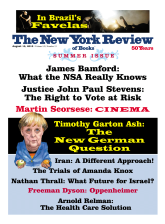In response to:
Berkeley: What We Didn't Know from the May 23, 2013 issue
To the Editors:
I appreciate Adam Hochschild’s review of my book, Subversives: The FBI’s War on Student Radicals, and Reagan’s Rise to Power [NYR, May 23], especially since he was a reporter on the scene yet still found much new about the FBI’s covert operations at the University of California during the Sixties and the bureau’s efforts to oust UC President Clark Kerr, stifle student leader Mario Savio, and help neophyte politician Ronald Reagan. As Hochschild wrote, “Although Rosenfeld far overstates the bureau’s influence on Reagan’s rise, it is nonetheless jarring to see how much help he got from an agency that was supposed to stay above partisan politics.”
In fact, I quantify Hoover’s help to Reagan only during the post–World War II years in Hollywood, after FBI agents enlisted Reagan in the bureau’s fight against communism as a film industry informer. His interaction with agents profoundly influenced him at this point, I wrote, catalyzing his rightward turn and setting him on a path that would lead him into politics. This is based on Reagan’s statements and previously withheld FBI files.
In the 1960s, FBI records also show, Hoover spread false allegations of campus subversion via media contacts, political allies, and bureau papers like “Communist Target—Youth.” He sought to discredit not only Savio, but also Kerr. Hoover’s efforts helped build a conservative consensus. Sometimes they backfired and fanned demonstrations. Since the incumbent governor, the Democrat Edmund G. “Pat” Brown, backed Kerr, Hoover’s machinations put Democrats on the defensive and indirectly helped Reagan, who had made Berkeley protests a key campaign issue. Once Reagan was elected governor, Hoover aided him directly, providing political intelligence about the university.
The FBI was not the only influence on Reagan’s political evolution, but there is ample evidence it was a deep one, long obscured by Reagan and the FBI.
Seth Rosenfeld
San Francisco, California



